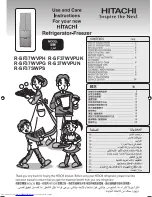
Suggestion on food storage
26
ENGLISH
Storing foods
•
Store fresh food in the refrigerator compartment. How food is frozen and thawed is an
important factor in maintaining its freshness and flavour.
•
Do not store food which goes bad easily at low temperatures, such as bananas, and
melons.
•
Allow hot food to cool prior to storing. Placing hot food in a refrigerator could spoil
other food, and lead to higher energy consumption.
•
When storing food, cover it with vinyl wrap or store in a container with a lid. This
prevents moisture from evaporating, and helps food to keep its taste and nutrients.
•
Do not block air vents with food. Smooth circulation of chilled air keeps refrigerator
temperatures even.
•
Do not open the door frequently. Opening the door lets warm air enter the refrigerator
and causes temperatures to rise.
•
Never keep too much food in the door rack as it may push against the inner racks so
that the door cannot fully close.
•
Do not put items filled with water on the refrigerator.- If spilled, there is a risk of fire or
electric shock.
•
Do not overfill the refrigerator with food. - When you open the door, an item may fall
out and cause personal injury or material damage.
•
Do not put items filled with water on the refrigerator.- If spilled, there is a risk of fire or
electric shock.
•
Do not place a lighted candle in the refrigerator for removing bad odors. - This may
result in electric shock or fire.
•
Bottles should be stored tightly together so that they do not fall out.
•
Do not store bottles in the freezer compartment - they may break when frozen.
•
Do not refreeze food that has been thawed. This causes loss of taste and nutrients.
•
Please observe maximum storage times and expiry dates of frozen goods.
•
When storing frozen food like ice cream for a long period, place it on the freezer shelf,
not in the door rack.
•
Do not touch cold foods or containers - especially metallic containers - with wet hands
or place glass products in the freezer compartment.
- You may get chill blains, and glass containers may break when frozen, causing
personal injury.
•
Avoid placing sauces on top refrigerator shelves, which could freeze on direct contact
with chilled air.
•
Always clean food prior to refrigeration. Vegetables and fruits should be washed and
wiped, and packed food should be wiped, to prevent adjacent food from spoiling.
•
When storing eggs in their storage rack or box, ensure that they are fresh, and always
store them in an upright position, which keeps them fresh longer.
Freezer
Compartment
Refrigerator
Compartment
•
If you keeping the refrigerator in a hot and humid place, frequently open the door or
store a lot of vegetables, dew may form. This has no effect on operation or
performance. Remove the dew with an absorbent dry cloth.
NOTE
CAUTION
CAUTION
CAUTION












































